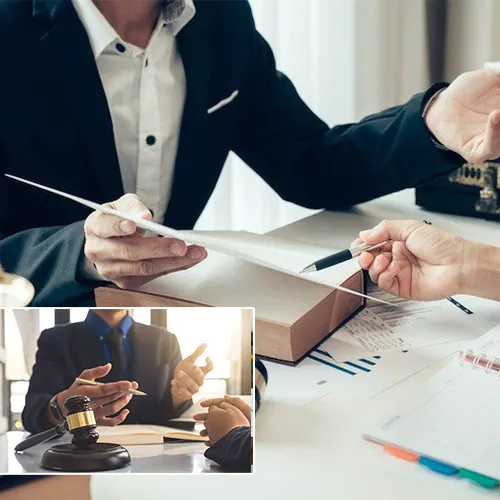Understanding Your Rights: DUI Checkpoint Legality
Table of Contents []
DUI Checkpoint Legality
Diving into DUI Checkpoint Legality: Understanding Your Rights

When it comes to driving under the influence (DUI) checkpoints, knowing your rights and the legal expectations of law enforcement is paramount. At John M Lane Law, we understand the importance of these checkpoints in keeping our roads safe. We're here to offer a wealth of resources to shed light on the legality of these DUI checkpoints. Our mission is to ensure you're well-informed about the processes and rights involved, so you can navigate these situations with confidence.
Imagine driving home and suddenly encountering a DUI checkpoint. It's natural to feel uncertain about what is expected of you and what rights you have. That's where we come in. We will guide you through the complexities of these legal scenarios, ensuring you understand the proper procedures law enforcement must adhere to at these checkpoints.
At any moment you have questions or need to schedule a consultation, don't hesitate to reach out to us for expert advice at (512) 712-4794. Our dedicated team is here to support you, across the nation, whatever your query may be.
Why DUI Checkpoints Exist
DUI checkpoints serve a crucial role in public safety, aiming to deter and prevent impaired driving. These checkpoints are conducted by police to systematically stop vehicles and check for intoxicated drivers. They have been a topic of debate, but the intention behind them is clear: to save lives by reducing the number of accidents caused by impaired drivers.
The legal justification for these checkpoints often stems from a balance between an individual's rights and the community's safety. However, it is critical that these checkpoints operate within the bound of the law to ensure that individual's rights are not encroached upon.
The Legality of DUI Checkpoints
The United States Supreme Court, in a notable decision, deemed that DUI checkpoints do not inherently violate the Fourth Amendment. This decision set forth the tone for how DUI checkpoints should be conducted. However, there are specific legal criteria that must be fulfilled for these checkpoints to be considered constitutional.
Differing state laws also come into play with DUI checkpoints. Some states permit them, while others do not. At John M Lane Law, we can help you understand the specific laws that apply in your area and ensure that you are equipped with the necessary knowledge.
Knowing Your Rights at a DUI Checkpoint
When you come to a DUI checkpoint, you retain certain rights that protect you under the law. You have the right to remain silent, and in some situations, you may even legally turn around to avoid the checkpoint, provided you do so safely and without committing any traffic violations.
Understanding these rights is imperative. At John M Lane Law, we emphasize education and awareness so that if you are stopped at a checkpoint, you can make informed decisions while being respectful to law enforcement officers.
When To Seek Legal Assistance
If you believe that the procedures at a DUI checkpoint were improperly conducted or if your rights were infringed upon, it's essential to seek legal counsel. An expert attorney can offer advice and representation that align with your interests and legal protections.
Our team is always ready to connect you with professionals who are well-versed in DUI laws and the nuances of DUI checkpoints. For any doubts or to discuss any concerns, we're just a call away at (512) 712-4794. Let us help you stand up for your rights.
The Procedures of Law Enforcement at Checkpoints

Law enforcement officials are not exempt from following defined protocols during DUI checkpoints. There are accepted procedures that they must follow to ensure the legality of these stops. John M Lane Law provides insight into the intricacies of such operations, equipping you with the know-how to recognize whether a checkpoint is being conducted by the book.
Recognizing these procedures can give you peace of mind and can also serve as an essential check against potential abuses or missteps that could affect your legal situation. Let's explore what officers are expected to do during these checkpoints.
Traffic Stops Must Be Neutral and Systematic
During DUI checkpoints, officers are expected to stop vehicles based on a neutral, systematic approach. This method eliminates the possibility of bias or discrimination, with every vehicle subject to the same likelihood of being checked. It could be every third vehicle, or it could be every vehicle-what matters is the established pattern.
A pre-determined formula is essential for the checkpoint to be considered legitimate. This is one of the critical aspects of ensuring the legality of these roadside checks.
Public Awareness Is a Key Requirement
Transparency is vital, and the public must be informed in advance when and where DUI checkpoints will be set up. This disclosure serves as a deterrent to impaired driving and is also a measure that supports the right to due process.
Publicizing a DUI checkpoint may seem counterintuitive, but it's a fundamental part of the legal framework that governs these checks. This ensures that the checkpoints are not arbitrary or surprising to the public.
Duration and Time Must Be Justifiable
The length of each checkpoint stop should be minimal, just enough to ask a few questions or observe signs of impairment. Excessive delays or detentions without cause can violate an individual's rights.
The time of day and duration of the checkpoint also need to be reasonable, typically occurring during times when DUIs are statistically more likely to happen. These should not be intrusive to the point of causing substantial inconvenience to drivers without justification.
The Location Should Be Safe and Practical
Checkpoints should be in locations where there have been issues with impaired driving in the past. They should also be safe for both law enforcement officers and the public, with clear signage and safe conditions for traffic flow. The goal is not to entrap drivers but to maintain safety on the roads.
Ensuring the proper location also means taking into account the safety of the setup itself, with attention to lighting, signage, and the overall management of the checkpoint.
Professional Conduct Is Non-negotiable
Officers must maintain a professional demeanor throughout the process. Any form of disrespectful or unprofessional behavior can be noted and reported. The conduct of law enforcement during these checkpoints is just as crucial as the procedural aspects.
An officer's behavior during a stop can significantly impact the legitimacy and perception of a DUI checkpoint. It is essential that they uphold the highest standards of professionalism.
Your Options and Obligations at a DUI Checkpoint

It's beneficial to be aware of your choices and obligations when approaching a DUI checkpoint. While it is natural to feel anxious, understanding what is expected of you and what choices you have can help you remain composed and cooperative. John M Lane Law is committed to making sure you know not only your rights but also your responsibilities in such scenarios.
Let's take a closer look at actions you can take during these interactions, as well as what is required of you by law. Being prepared can make all the difference in handling these situations effectively.
Your Right to Remain Silent
One of your fundamental rights is the right to remain silent. While you must provide your license, registration, and proof of insurance, you are not obliged to answer potentially incriminating questions. Politely stating that you wish to exercise your right to remain silent is within your legal rights.
Being silent should not be confused with being uncooperative. You can comply with reasonable requests from officers without engaging in a dialogue that could put you at a disadvantage.
Respectful Cooperation Goes a Long Way
While being firm with your rights is crucial, it's also important to be polite and cooperative with law enforcement. Respecting the officer's safety and the checkpoint's purpose can help the process go smoothly for everyone involved.
Simple acts, such as turning down your music, keeping your hands visible, and complying with straightforward instructions, can help ensure a safe and respectful interaction.
Turning Around Is Sometimes an Option
If you see a DUI checkpoint up ahead and prefer not to pass through it, you might have the option to legally turn around, as long as it's safe and lawful to do so. This is not an admission of guilt but rather a personal choice.
However, it's crucial not to make any illegal maneuvers or give officers reasonable suspicion to pull you over. Be mindful of your driving behavior at all times.
Understanding the Possible Outcomes
Depending on the interaction at a checkpoint, you may simply be waved through after a brief stop, or you may be subjected to further screening if there is reasonable suspicion of impairment. Knowing the possible avenues can help reduce stress and uncertainty.
Remember that each situation is unique, and outcomes will vary based on the circumstances. Stay calm and focused on the interaction, knowing that our team stands ready to assist you at (512) 712-4794.
When It's Time to Call an Attorney
If you believe your rights have been violated or if you're facing charges related to a DUI checkpoint, it is critical to get in touch with an attorney as soon as possible. Legal expertise is invaluable in these instances.
A qualified attorney can evaluate the situation, provide guidance on next steps, and represent you in court if necessary. Don't hesitate to reach out for legal support when you need it.
Connecting with Expert Legal Guidance Through John M Lane Law

Navigating the legal terrain of DUI checkpoints can be complex and challenging. John M Lane Law is here to serve as a bridge, connecting you with comprehensive resources and experienced attorneys who can offer precise guidance and robust representation. We believe in educating and empowering the public, so you can face these situations with confidence and clarity.
It is our priority to ensure that everyone who turns to us for help can benefit from our in-depth understanding of the law. Our commitment to serving you nationally means no matter where you are, you have access to information and assistance that can make a real difference.
Explore Our Informative Resources
We offer various resources that will help you deepen your understanding of DUI checkpoint procedures and legality. Our materials are designed to be straightforward, providing you with clear insights into what you need to know.
From articles and FAQs to real-life scenarios, John M Lane Law ensures you have the tools to stay informed. Our resource library is always expanding, with the latest legal trends and rulings included.
Gain Access to a Network of Skilled Attorneys
John M Lane Law has developed a network of legal professionals specializing in DUI laws and checkpoint cases. By reaching out to us, we can connect you with an attorney who can provide the targeted support and advocacy you require.
Our connections span the nation, meaning you'll find the right expert no matter where you're located. We are dedicated to helping you find the best possible legal representation.
Get your questions answered by our team
Our friendly and knowledgeable team is always on hand to answer any questions you might have. Whether you're seeking clarification on a legal point or need to discuss booking a consultation, we're just a conversation away.
Contact us at (512) 712-4794 for reliable answers and compassionate support. We take pride in being approachable and responsive to your needs.
Schedule a Consultation Today
Don't wait until it's too late. If you're facing challenges related to a DUI checkpoint or simply want to know more about your rights, schedule a consultation with one of our experts. Proactive action can be key to a positive outcome.
Booking an appointment is simple get started by calling our team at (512) 712-4794. Let us provide you with the guidance you deserve as you navigate the legal system.
In conclusion, understanding the legality of DUI checkpoints is crucial for every driver. At John M Lane Law, we are not only aware of the critical nature of these checkpoints but also the debates surrounding their implementation. Our goal is to educate you about the complexities of DUI checkpoint legality, informing you about your rights while driving. For any questions or to book an appointment with an expert attorney, reach out to us anytime at (512) 712-4794. We're here for you, nationwide.
Previous Page
